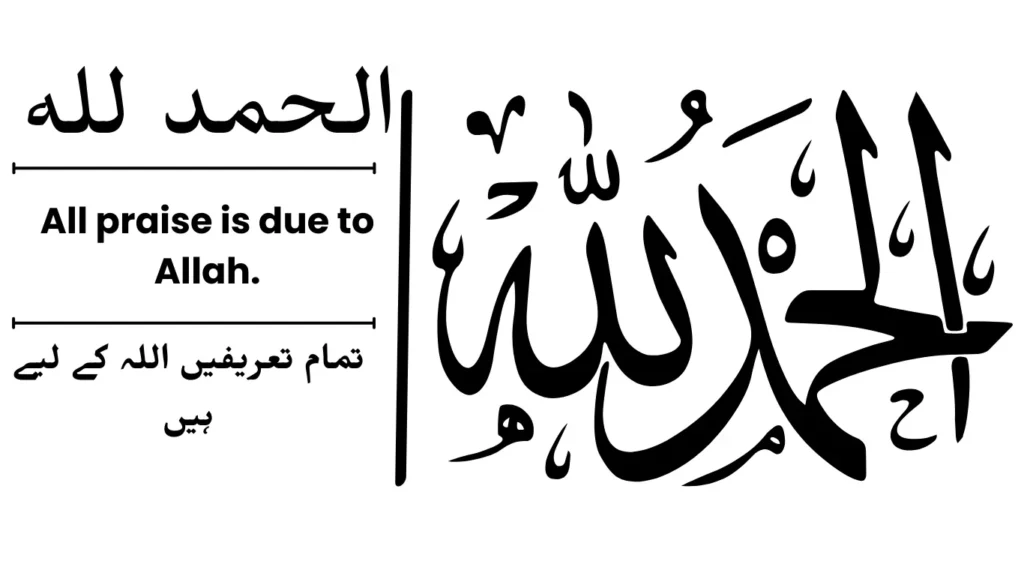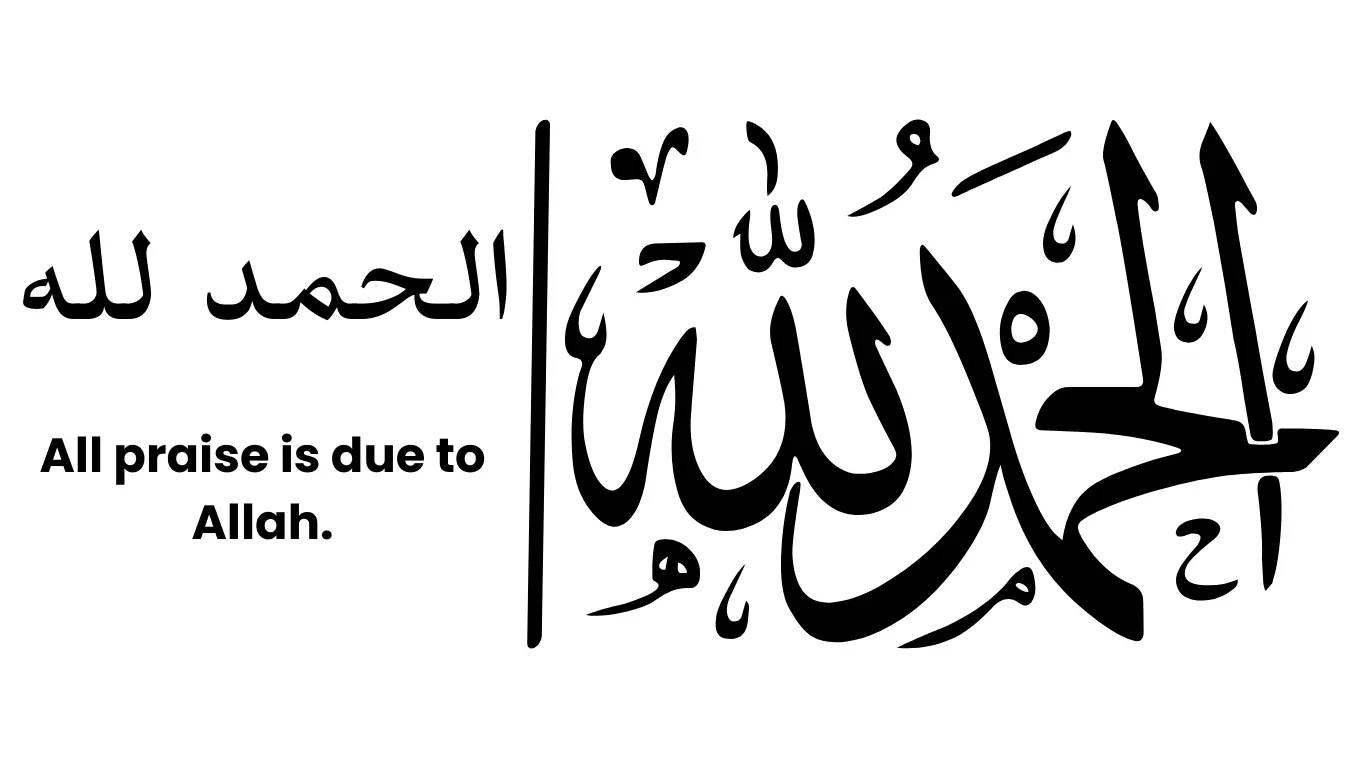Introduction
In Islam, gratitude is a core value that shapes the way Muslims view their lives, connecting them closer to Allah. The phrase Alhamdulillah (Arabic: الحمد لله) holds significant spiritual weight, expressing gratitude, humility, and acknowledgment of Allah’s blessings. For Urdu speakers and readers, understanding this phrase goes beyond its simple meaning; it represents a daily reminder of faith and blessings. This article explores the meaning, importance, and blessings of saying Alhamdulillah, along with its Urdu translation, examples of usage, and powerful insights on its role in Muslim lives.
What is the Meaning of Alhamdulillah?
The phrase “Alhamdulillah” translates to “All praise is due to Allah” in English, and it’s often recited to express gratitude towards Allah. Muslims use it in daily prayers, after completing tasks, or simply as a habitual phrase to remind themselves of Allah’s presence and mercy. “Alhamdulillah” is a phrase filled with reverence, implying that every blessing—big or small—is worthy of thanks to Allah alone.
Alhamdulillah in Arabic, Urdu, and English
- Arabic: الحمد لله
- Urdu: اَلْحَمْدُ لِلّٰه
- English: All praise is due to Allah.
The simplicity of this phrase embodies a profound meaning, encouraging Muslims to remember Allah’s countless blessings and to remain humble and grateful.

The Significance of Alhamdulillah in Islam
The significance of “Alhamdulillah” is far-reaching in Islam. It appears in various forms in the Quran and Hadith, illustrating its importance as a means to express appreciation and a reminder to recognize Allah’s continuous guidance and support. Muslims are taught that gratitude brings blessings, and uttering “Alhamdulillah” regularly nurtures a strong connection with Allah.
Quranic Verse Highlighting Gratitude
The Quran frequently reminds Muslims to be thankful. In Surah Ibrahim (14:7), Allah says:
Arabic: وَإِذْ تَأَذَّنَ رَبُّكُمْ لَئِن شَكَرْتُمْ لَأَزِيدَنَّكُمْ
Transliteration: Wa-ith ta’aththana rabbukum la-in shakartum la-azeedannakum
English Translation: “And [remember] when your Lord proclaimed, ‘If you are grateful, I will surely increase you [in favor].'”
Urdu Translation: اور جب تمہارے رب نے اعلان کیا کہ اگر تم شکر گزار بنو گے تو میں تمہیں مزید نوازوں گا۔
This verse reassures believers that expressing gratitude, particularly through phrases like “Alhamdulillah,” will attract more blessings.
| What is allahumma barik meaning in urdu? |
| Ghusal Ka Tarika |
| Wazu Ka Tarika: A Step-by-Step Guide |
| Washroom Ki Dua: A Comprehensive Guide |
Benefits of Saying Alhamdulillah Regularly
Saying “Alhamdulillah” has numerous benefits, both spiritual and psychological. Here are a few key advantages:
- Increases Gratitude: By frequently saying “Alhamdulillah,” a Muslim nurtures a sense of contentment and reduces negativity.
- Strengthens Faith: Recognizing Allah’s favors reminds believers of Allah’s omnipotence, fostering a deeper spiritual connection.
- Promotes Mental Peace: Gratitude helps shift focus from worries to blessings, providing calmness and inner peace.
- Brings Barakah (Blessings): Consistent gratitude draws Allah’s favor, increasing blessings in various aspects of life, as promised in the Quran.
Usage of Alhamdulillah in Daily Life
Muslims are encouraged to say “Alhamdulillah” in various situations, whether during daily routines or special moments. Here are some examples:
- After Meals: Saying “Alhamdulillah” after eating acknowledges that Allah is the ultimate provider.
- Upon Hearing Good News: Expressing “Alhamdulillah” when something positive happens is a way to thank Allah for His mercy.
- During Hard Times: Muslims are taught to say “Alhamdulillah” even in difficult situations, as a reminder that Allah’s plan is ultimately beneficial, even if it’s not immediately apparent.
Translating “Alhamdulillah” in Urdu Context
For Urdu-speaking Muslims, “Alhamdulillah” translates as “تمام تعریفیں اللہ کے لیے ہیں” (tamam tareefen Allah ke liye hain), which carries the same reverence as in Arabic. In Urdu culture, “Alhamdulillah” is frequently expressed in both spoken and written forms, signifying gratitude and faith in all of Allah’s blessings.
The Power of Gratitude in Islam
Gratitude (shukr) in Islam goes beyond just saying “thank you” or “Alhamdulillah.” It is a form of worship and obedience. In the Hadith, Prophet Muhammad (PBUH) said:
“He who does not thank people, does not thank Allah.” (Tirmidhi)
This highlights the importance of recognizing and appreciating blessings from both Allah and those around us. “Alhamdulillah” becomes a tool for Muslims to live a life of purpose, gratitude, and humility.
FAQs:
In Urdu, “Alhamdulillah” means “تمام تعریفیں اللہ کے لیے ہیں” (tamam tareefen Allah ke liye hain), which translates to “All praise is for Allah.
Muslims say “Alhamdulillah” during daily prayers, after meals, upon receiving good news, or even during hardships to thank Allah for His blessings and acknowledge His wisdom.
Saying “Alhamdulillah” regularly increases gratitude, strengthens faith, brings mental peace, and attracts Allah’s blessings as it shifts focus to the positive aspects of life.
Conclusion
Saying “Alhamdulillah” in Urdu or any language is more than a mere expression; it’s an act of worship, a reminder of humility, and a pathway to peace and blessings. Whether one is fluent in Urdu, Arabic, or any other language, the phrase connects Muslims across cultures, uniting them in gratitude and faith. Embracing “Alhamdulillah” as a daily habit fosters a positive outlook, keeping the heart closer to Allah and ensuring a life filled with contentment and divine favor.





hello there and thank you for your information – I’ve definitely picked up anything new from right here.
I did however expertise some technical issues using this site, since I experienced to reload the site lots of times previous to
I could get it to load correctly. I had been wondering
if your web host is OK? Not that I am complaining, but
slow loading instances times will often affect your placement in google and can damage your high-quality
score if ads and marketing with Adwords. Anyway I am adding this RSS to my email and could look out for a lot more of your respective interesting content.
Ensure that you update this again very soon.